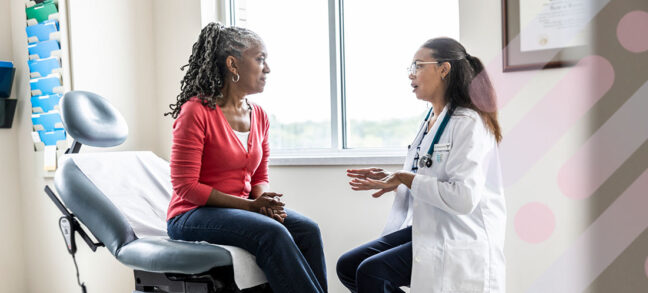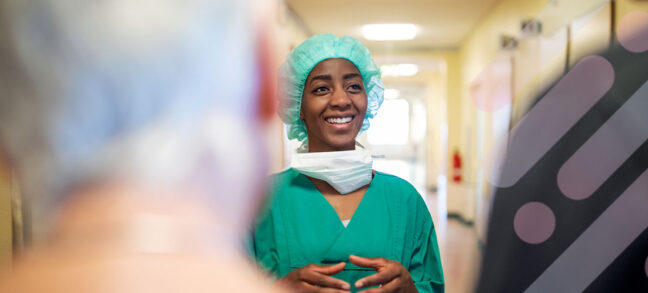Dr. Anne Peled has a unique perspective to share—as both a breast cancer survivor and board-certified plastic surgeon who specializes in breast cancer surgery and breast reconstruction, she’s faced this experience from both sides of the table. She’s passionate about guiding women through the process and helping them understand their options. Dr. Peled says she regularly sees women who were never told they should expect to lose sensation after their mastectomy.
She helps us understand why numbness happens, how it affects women and what we can all do to advocate for better treatment options.
why numbness happens
Dr. Peled explains, “Until recently, looking for nerves during mastectomy hasn’t been prioritized. Which means that many nerves that could have potentially been preserved are cut when the rest of the breast tissue is removed. This will likely result in numbness as well as possible scar tissue forming around the end of the cut nerve, potentially leading to chronic pain or other nerve issues.”
She also explains, “There is some overlap with nerves, which means some women may get some sensation back after mastectomy without consciously trying to keep or restore any nerves.” But, as she has learned in her practice, even carefully preserving the nerves is not enough.
“Most women would not be able to have successful restoration of sensation by just preserving the nerves. But now we have technology, through Resensation®, to potentially restore nerve function and provide this vast group of women a potential solution.”
living with loss of sensation
Dr. Peled shares that it can be difficult for patients to fully comprehend what the loss of sensation may mean long-term. She often uses a dentist analogy to help women fully grasp the magnitude. “Imagine how awkward your mouth feels after your dentist numbs it with lidocaine. Now imagine that loss of feeling across your entire chest.” It can also affect everyday activities like not feeling your chest when you put on a sports bra to go exercise.
“Even at the most basic level, when you explain numbness, women do not want that. It’s important to understand the effect loss of sensation has and what that might mean for your life longer-term,” Dr. Peled says.
Loss of sensation, as Dr. Peled notes, affects women on many levels—emotional and physical. It makes it difficult to feel like your reconstructed breasts are your own, creating a range of challenges. For one, it can leave women more susceptible to burns or bruises. It can also lead to embarrassing moments, like not realizing your breasts have slipped out of your bathing suit. Numbness can also change the role breasts play in intimacy and sexuality, affecting relationships. And perhaps worst of all, it can make it impossible to move past your cancer experience and feel like yourself again.
you have time
When women are first diagnosed, it can feel incredibly overwhelming. Often, understandably, their only goal is to get the cancer out; it’s hard to think ahead to recovery and how you might feel after a mastectomy. Dr. Peled encourages women to take time to figure out what is the best treatment for them and to find the most advanced treatment in their area.
“In nearly all cases you have time to do your research. I think people end up rushing into procedures without realizing the negative, long-term consequences. With a little more time and research, they could have had the exact same cancer outcome, but a dramatically different day-to-day life as a result of a different procedure,” says Dr. Peled.
By gathering all the facts ahead of time, Dr. Peled explains, breast cancer patients can experience the same cancer-related outcome, but find a much better, less disruptive way to get there.
“We see many women choose mastectomy who might be lumpectomy candidates because they weren’t informed that, from a cancer standpoint, their outcome would be the same. There are many women for whom mastectomy is a better choice regardless, but they’re not armed with the information they need to decide.”
seek out fellow survivors
Breast cancer survivors, thrivers and previvors make up a huge, supportive community of women. Many of them are eager to share their journeys and help other women. Dr. Peled encourages breast cancer patients to lean on and seek out these supporters. She points out that it’s an opportunity to learn about procedures that even your surgeon may not know about.
“Reach out through social media. By hearing what other women in a similar situation have gone through, even though every situation is different, and the procedure one woman had may not be an option for you, at least you know it’s out there. And you know what options exist. Relying on the community of women who’ve been through this before is really helpful.”
express your goals and priorities
“Make sure that you’re able to express your goals and priorities with your surgeon. Whether that’s exercising as soon as possible, avoiding or minimizing future surgeries, or getting back to taking care of your kids—every woman’s journey and every woman’s priorities are different. But without expressing those to your surgeon, it’s very difficult for her or him to understand how to have a shared decision-making conversation with you about what might be your best option.”
ask the question
Never underestimate the power of asking a question. As more breast cancer specialties focus on survivorship and the potential negative impacts of the treatments they perform, your questions hold more weight. Dr. Peled explains, “The more patients that ask their surgeon about the possibilities for regaining sensation, the more likely it is that surgeons will realize it’s an issue. Asking about it helps improve the level of advancement of options for everyone.”
This is your journey. As you discuss your options with a qualified care team, never be afraid to speak up, push for more answers and express what really matters to you.
If you’d like to talk to a surgeon like Dr. Peled about your options for reconstruction following a mastectomy, use our surgeon locator tool to find a surgeon in your area.
Dr. Peled did not receive compensation from Axogen Corporation for her time in connection with this interview.
Resensation Blog

How does mastectomy impact the nerves in the breast?
One sometimes overlooked aspect of mastectomy is its impact on nerves. Read what happens to nerves during mastectomy and explore…
Read More
What happens during implant breast reconstruction with Resensation®?
By repairing sensory nerves, Resensation® enables you to potentially regain sensation to your chest. Read how this procedure works during…
Read More
how resensation® helped Leanna feel secure in her family’s future
With Resensation®, Leanna can be there to watch her kids grow up—without losing the feeling of being whole.
Read More
sensory retraining: what is it, and how can it help me after resensation®?
Sensory retraining is a series of exercises designed to help you reconnect with your body after breast reconstruction with Resensation®.
Read More